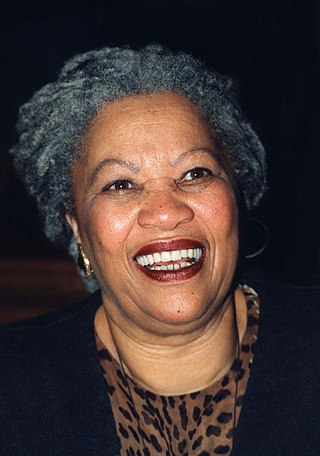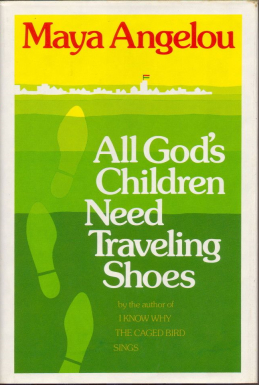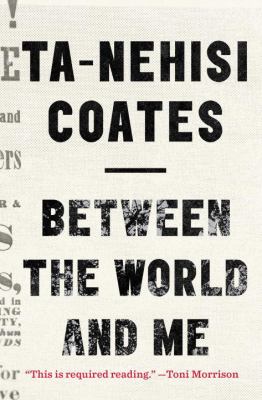
Chloe Anthony Wofford Morrison, known as Toni Morrison, was an American novelist and editor. Her first novel, The Bluest Eye, was published in 1970. The critically acclaimed Song of Solomon (1977) brought her national attention and won the National Book Critics Circle Award. In 1988, Morrison won the Pulitzer Prize for Beloved (1987); she was awarded the Nobel Prize in Literature in 1993.

James Arthur Baldwin was an African-American writer and civil rights activist who garnered acclaim for his essays, novels, plays, and poems. His 1953 novel Go Tell It on the Mountain has been ranked by Time magazine as one of the top 100 English-language novels. His 1955 essay collection Notes of a Native Son helped establish his reputation as a voice for human equality. Baldwin was an influential public figure and orator, especially during the civil rights movement in the United States.

Maya Angelou was an American memoirist, poet, and civil rights activist. She published seven autobiographies, three books of essays, several books of poetry, and is credited with a list of plays, movies, and television shows spanning over 50 years. She received dozens of awards and more than 50 honorary degrees. Angelou's series of seven autobiographies focus on her childhood and early adult experiences. The first, I Know Why the Caged Bird Sings (1969), tells of her life up to the age of 17 and brought her international recognition and acclaim.

I Know Why the Caged Bird Sings is a 1969 autobiography describing the young and early years of American writer and poet Maya Angelou. The first in a seven-volume series, it is a coming-of-age story that illustrates how strength of character and a love of literature can help overcome racism and trauma. The book begins when three-year-old Maya and her older brother are sent to Stamps, Arkansas, to live with their grandmother and ends when Maya becomes a mother at the age of 16. In the course of Caged Bird, Maya transforms from a victim of racism with an inferiority complex into a self-possessed, dignified young woman capable of responding to prejudice.

Tom Feelings was an artist, cartoonist, children's book illustrator, author, teacher, and activist. He focused on the African-American experience in his work. His most famous book is The Middle Passage: White Ships/Black Cargo (1995).

The Heart of a Woman (1981) is an autobiography by American writer Maya Angelou. The book is the fourth installment in Angelou's series of seven autobiographies. The Heart of a Woman recounts events in Angelou's life between 1957 and 1962 and follows her travels to California, New York City, Cairo, and Ghana as she raises her teenage son, becomes a published author, becomes active in the civil rights movement, and becomes romantically involved with a South African anti-apartheid fighter. One of the most important themes of The Heart of a Woman is motherhood, as Angelou continues to raise her son. The book ends with her son leaving for college and Angelou looking forward to newfound independence and freedom.

Gather Together in My Name is a 1974 memoir by American writer and poet Maya Angelou. It is the second book in Angelou's series of seven autobiographies. Written three years after the publication of and beginning immediately following the events described in I Know Why the Caged Bird Sings, it follows Angelou, called Rita, from the ages of 17 to 19. The title is taken from the Bible, but also conveys how one Black female lived in the white-dominated society of the U.S. following World War II.
Mikell's was a jazz club on the corner of 97th Street and Columbus Avenue, in New York City.

All God's Children Need Traveling Shoes, published in 1986, is the fifth book in African-American writer and poet Maya Angelou's seven-volume autobiography series. Set between 1962 and 1965, the book begins when Angelou is 33 years old, and recounts the years she lived in Accra, Ghana. The book, deriving its title from a Negro spiritual, begins where Angelou's previous memoir, The Heart of a Woman, ends — with the traumatic car accident involving her son Guy — and closes with Angelou returning to America.

A Song Flung Up to Heaven is the sixth book in author Maya Angelou's series of autobiographies. Set between 1965 and 1968, it begins where Angelou's previous book All God's Children Need Traveling Shoes ends, with Angelou's trip from Accra, Ghana, where she had lived for the past four years, back to the United States. Two "calamitous events" frame the beginning and end of the book—the assassinations of Malcolm X and Martin Luther King Jr. Angelou describes how she dealt with these events and the sweeping changes in both the country and in her personal life, and how she coped with her return home to the U.S. The book ends with Angelou at "the threshold of her literary career", writing the opening lines to her first autobiography, I Know Why the Caged Bird Sings.

The themes encompassed in African-American writer Maya Angelou's seven autobiographies include racism, identity, family, and travel. Angelou (1928–2014) is best known for her first autobiography, I Know Why the Caged Bird Sings (1969). The rest of the books in her series are Gather Together in My Name (1974), Singin' and Swingin' and Gettin' Merry Like Christmas (1976), The Heart of a Woman (1981), All God's Children Need Traveling Shoes (1986), A Song Flung Up to Heaven (2002), and Mom & Me & Mom (2013).

Oh Pray My Wings Are Gonna Fit Me Well is a book of poems by American author Maya Angelou, published by Random House in 1975. It is Angelou's second volume of poetry, written after her first two autobiographies and first volume of poetry were published. Angelou considered herself a poet and a playwright, but was best known for her seven autobiographies, especially her first, I Know Why the Caged Bird Sings, although her poetry has also been successful. She began, early in her writing career, alternating the publication of an autobiography and a volume of poetry. Although her poetry collections have been best-sellers, they have not received serious critical attention.

Maya Angelou, an African-American writer who is best known for her seven autobiographies, was also a prolific and successful poet. She has been called "the black woman's poet laureate", and her poems have been called the anthems of African Americans. Angelou studied and began writing poetry at a young age, and used poetry and other great literature to cope with trauma, as she described in her first and most well-known autobiography, I Know Why the Caged Bird Sings. She became a poet after a series of occupations as a young adult, including as a cast member of a European tour of Porgy and Bess, and a performer of calypso music in nightclubs in the 1950s. Many of the songs she wrote during that period later found their way to her later poetry collections. She eventually gave up performing for a writing career.

Between the World and Me is a 2015 nonfiction book written by American author Ta-Nehisi Coates and published by Spiegel & Grau. It was written by Coates as a letter to his then-teenage son about his perception of what the feelings, symbolism, and realities associated with being Black in the United States are. Coates recapitulates American history and explains to his son "racist violence that has been woven into American culture." Coates draws from an abridged, autobiographical account of his youth in Baltimore, detailing his beliefs about what are the ways in which, to him, institutions like schools, the local police, and even "the streets" discipline, endanger, and threaten to "disembody" black men and women.

Jessica B. Harris is an American culinary historian, college professor, cookbook author and journalist. She is professor emerita at Queens College, City University of New York, where she taught for 50 years, and is also the author of 15 books, including cookbooks, non-fiction food writing and memoir. She has twice won James Beard Foundation Awards, including for Lifetime Achievement in 2020, and her book High on the Hog was adapted in 2021 as a four-part Netflix series by the same name.

Rachel Kaadzi Ghansah is an American essayist. She won a Pulitzer Prize for Feature Writing in 2018 for her profile of white supremacist and mass murderer Dylann Roof, as well as a National Magazine Award. She was also a National Magazine Award finalist in 2014 for her profile of elusive comedian Dave Chappelle. Her first book, The Explainers and the Explorers, is forthcoming from Random House.

The Fire This Time: A New Generation Speaks About Race is an essay and poetry collection edited by the American author Jesmyn Ward and published by Scribner in 2016. The title, The Fire This Time, alludes to James Baldwin's seminal 1963 text, The Fire Next Time.

James Forman Jr. is an American legal scholar currently on leave from serving as the J. Skelly Wright Professor of Law at Yale Law School. He is the author of Locking Up Our Own: Crime and Punishment in Black America, which won the 2018 Pulitzer Prize for General Nonfiction, and a co-founder of the Maya Angelou School in Washington, D.C.
The Rainbow Sign was an African-American cultural center in Berkeley, California, that operated from 1971 to 1977. Vice President of the United States Kamala Harris frequently attended the center as a child, and described it as influential on her.

















